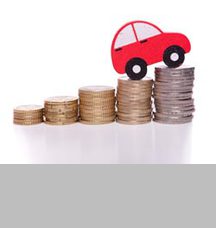When it comes to budgeting for a new car, make sure you consider more than just the sticker price. Other expenses like interest, taxes, insurance, gasoline, and maintenance all impact what you'll pay upfront and each month.
As you calculate the total monthly car costs you can afford, consider these factors before signing on the dotted line for a new car.
Financing
If you finance your car instead of purchasing it in full, you'll likely incur extra costs in the form of interest. Depending on the loan term and other factors, the interest rate can vary. All other credit terms being equal, you can usually lower your interest costs in a few ways:
- A large down payment will help reduce the amount that you are financing and therefore the total interest you'll incur, which will also lower your monthly payments.
- Loan terms with a shorter repayment period typically involve higher monthly payments but allocate more of your monthly payment to principal, so you may pay less in interest.
- Compare multiple dealerships and their financing options. If you're purchasing a new car, a dealership may offer a promotional low- or no-interest payment option.
License Plate, Title, Registration, and Taxes
When you buy a car, you'll also have to pay sales tax, which is calculated based on the total cost of your vehicle and may be due either at the time that the car is purchased or over a period of time depending on the state in which the car is purchased. Some states also charge an annual tax on your car, which can vary based on the size and type of car you drive. When you combine annual taxes with license plate, registration and title fees, these required add-ons may cost you an average of $500 to $800 or more a year.
Insurance
The cost of monthly car insurance can vary widely, as it depends on your age, driving history, lifestyle, and the type of vehicle you own. Even students' grades can factor into insurance costs. Ask your insurance company about the various rates for the cars you're considering, as some vehicles are less expensive to insure than others. You may also want to check for any discounts available to you. Work with your insurance agent to review your policies annually to ensure they meet your current insurance needs and that you are considered for any discounts for which you may be newly qualified to receive.
Gasoline
Gas mileage can vary dramatically depending on the type of car you drive, how you drive, and other factors. Your monthly gas budget will change depending on gas prices, how frequently you drive, and the type of fuel your car requires. If you drive long distances daily in a large, older model, SUV, gas can cost you significantly more a year than it would if you drove a small sedan that has been designed to be very fuel efficient.
Tires and Maintenance
You'll need to maintain your car with oil changes, tire rotations, and other regular care. Research the recommended frequency of maintenance for each car you are considering. Before you buy a new car, ask what kind of oil the car requires, as there can be a significant difference in price between basic and premium oils. You can look for cars that use synthetic oils, which can be more costly but require less frequent changes. You can also try to negotiate a maintenance package with the dealer before you purchase your car to save money long term.
In addition, you may need to replace your tires every few years. When looking at tire prices, consider both the tire and labor costs to account for the whole package.
Depreciation
While this may not feel like a monthly expense, it can be your biggest financial loss once you decide to sell or trade in your car because your car is a depreciating asset. A new car loses an average of 11 percent of its value once you drive it off the lot. The average car is worth 37 percent of the dealership price after five years. Edmunds and Kelley Blue Book offer information about cars' selling prices and can give you a general idea of what car makes and models tend to retain their value.
If you want to minimize depreciation, you have several options:
- Choose a car that retains its value, even after several years.
- Choose a reliable car that will last for many years, so you can maximize the car's value per year.
- Consider buying a used car, as the original owner will have taken the biggest hit in depreciation.
When you buy a new car, take into account all the associated fees so you can accurately calculate your monthly car payment and all related costs. Use the Regions car payment calculator to determine how much you can afford to spend, so you can drive off the lot in a vehicle that fits into your budget.










